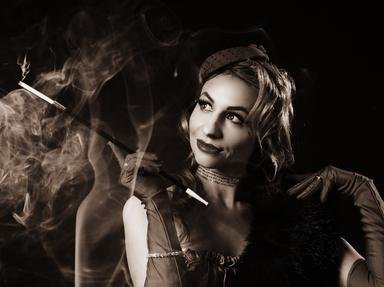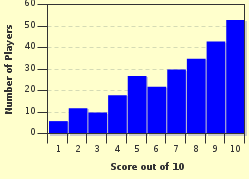Quiz Answer Key and Fun Facts
1. Which ground-breaking film of 1960 starred a youthful Albert Finney as Arthur Seaton, an "angry young man" working in a factory in a grimy northern industrial town?
2. A classic film directed by David Lean is "Lawrence of Arabia" (1962) which starred newcomer Peter O'Toole in the title role of the World War I hero who united the arabs to fight the common foe (Turkey) in the harsh deserts of Saudi Arabia. Lawrence was seen holding a lit match in the palm of his hand until it burned him. When asked what's the trick how did he reply?.
3. During the '60s Michael Caine played a very reluctant, down-at-heel spy (the very opposite of James Bond) in three movies based on books written by Len Deighton, the first (and arguably the best) being "The Ipcress File" (1965). What was the name of this spy?
4. "King and Country" (1964) was set in World War I and dealt with the reality of wasted lives by portraying a court martial of a British soldier accused of desertion and cowardice. Tom Courtenay played the tragic soldier but who memorably played his defence lawyer?
5. "A Man For All Seasons" (1966) starring Robert Shaw and Paul Scofield, and based on the stage play by Robert Bolt, dealt with the complex relationship between which two historical characters?
6. "Whistle Down The Wind" (1962) is a charming movie exploring the minds of impressionable young children, in this case a group of rural Lancashire schoolchildren (with wonderful Lancashire accents!) who found an escaped murderer in their barn and believed him to be Jesus. Hayley Mills was the lead child actress but who played "Jesus"?
7. Starring Dirk Bogarde, the thought-provoking movie "Victim" (1961) broke new ground by exploring which taboo subject?
8. "This Sporting Life" (1963) directed by Lindsay Anderson introduced the enigmatic Richard Harris to our screens. Which sport was the subject matter of the movie?
9. Which movie of 1964 featured two real-life characters named John Chard and Gonville Bromhead?
10. "Enfant terrible" Ken Russell directed "Women In Love" (1969) which included which controversial scene?
Source: Author
Charlie58
This quiz was reviewed by FunTrivia editor
jmorrow before going online.
Any errors found in FunTrivia content are routinely corrected through our feedback system.

